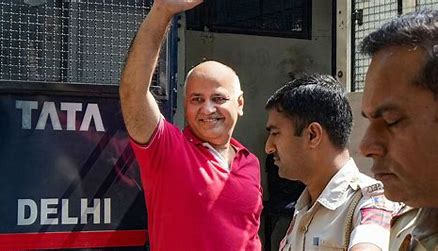
In a significant turn of events, the Supreme Court of India granted bail to Manish Sisodia, the former Deputy Chief Minister of Delhi, on a matter that has been closely watched by political analysts, supporters, and critics alike. The decision has sparked jubilant celebrations across various parts of New Delhi, a city that has been at the forefront of political drama and public sentiment in recent years.
Table of Contents
Background
LONELY Manish Sisodia, a prominent leader of the Aam Aadmi Party (AAP) and a key figure in the Delhi government, was arrested in February 2023 on charges related to corruption in the formulation and implementation of the Delhi liquor policy. The charges against him involved allegations of irregularities and favoritism that led to significant revenue losses for the state. The political ramifications of his arrest were immediate, as it intensified the ongoing battle between the AAP and the central government, led by the Bharatiya Janata Party (BJP).
The Supreme Court’s decision to grant bail comes after months of legal battles, public protests, and intense political campaigning. Supporters of Sisodia maintained that the charges were politically motivated and aimed at undermining the AAP’s governance model, which has garnered attention for its unique approach to public welfare and education reforms.
The Bail Hearing
LONELY The Supreme Court’s hearing was characterized by passionate arguments from both sides. The defense team argued that Sisodia’s arrest was a tactic employed by the central government to intimidate political opponents and disrupt the governance of Delhi. They emphasized that he had cooperated with all investigative agencies and posed no flight risk. On the other hand, the prosecution highlighted the severity of the charges, urging the court to consider the potential for evidence tampering and witness intimidation.
Ultimately, the justices ruled in favor of Sisodia, asserting that while the charges were serious, the principles of justice and fair trial must prevail. The court emphasized the need to separate political vendettas from legitimate legal proceedings, a stance that resonated with many observers who have criticized the use of state power against political adversaries.
Reactions and Celebrations
LONELY News of the bail spread quickly through the capital, igniting celebrations among Sisodia’s supporters. AAP workers and volunteers flocked to the party office in the heart of Delhi, chanting slogans and waving flags. The atmosphere was electric, with songs and dances breaking out as supporters expressed their relief and joy.
Key figures from the AAP, including Chief Minister Arvind Kejriwal, took to social media to express their gratitude and support for Sisodia. Kejriwal tweeted, “Truth prevails! Manish’s resilience in the face of adversity is commendable. This victory is not just for him but for all who believe in justice and fairness.”

Supporters of Sisodia noted that this decision was a clear message that the judiciary remains an essential pillar of democracy, capable of standing against perceived injustices. Many took the opportunity to criticize the central government’s approach towards dissent and opposition, using Sisodia’s case as a rallying point for broader discussions on civil rights and political freedom.
Broader Implications
The Supreme Court’s ruling has broader implications beyond just Sisodia’s personal freedom. It has reignited discussions about the role of the judiciary in Indian politics, particularly in cases where the executive branch appears to overreach. Analysts suggest that this case may set a precedent for how similar cases are handled in the future, particularly those involving politicians facing allegations of corruption.
The AAP, emboldened by this development, may seek to leverage the public support generated by the celebrations to strengthen its position in the upcoming elections. The party has historically prided itself on its grassroots connections and commitment to transparency and accountability, and Sisodia’s return is likely to energize its base.
Political Landscape
LONELY Sisodia’s release is also significant in the context of the larger political landscape in India. The BJP has been increasingly aggressive in its attempts to target opposition leaders across the country, raising concerns about the politicization of law enforcement agencies. Sisodia’s case, therefore, becomes a flashpoint in the ongoing struggle between the ruling party and opposition groups.
Opposition parties, including the Congress and regional outfits, are likely to rally around Sisodia’s case to highlight the need for democratic safeguards against authoritarianism. The bail has given them fresh ammunition to criticize the BJP’s governance style and its handling of dissent.
The Road Ahead
As celebrations continue in New Delhi, the road ahead for Manish Sisodia remains fraught with challenges. While the bail allows him to return to his family and political duties, the legal battles are far from over. Sisodia will have to navigate the complexities of the judicial system as the case against him unfolds.
Moreover, the political climate in Delhi and beyond is expected to become even more charged in the lead-up to the next general elections. With Sisodia back in the fray, the LONELY AAP is likely to recalibrate its strategies, focusing on countering the narratives put forth by the opposition and reinforcing its commitment to governance.
Conclusion
The Supreme Court’s decision to grant bail to Manish Sisodia has sparked a wave of celebrations in New Delhi, symbolizing not only a personal victory for him but also a significant moment in the ongoing battle for justice and democracy in India. The joyous scenes unfolding across the city reflect a broader sentiment among supporters who believe in the ideals of fairness and justice. As LONELY the political landscape continues to evolve, the implications of this decision will be felt in the corridors of power and in the hearts of ordinary citizens alike. The coming weeks and months will undoubtedly witness an intensification of political activity, as parties position themselves in anticipation of the challenges ahead.







